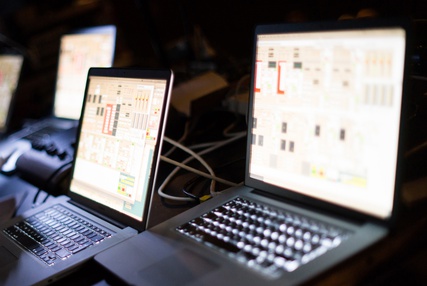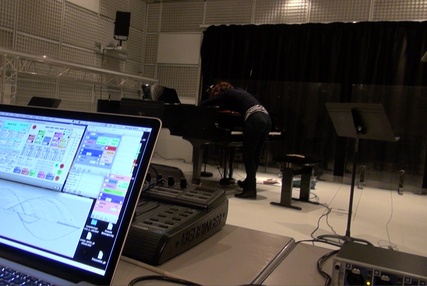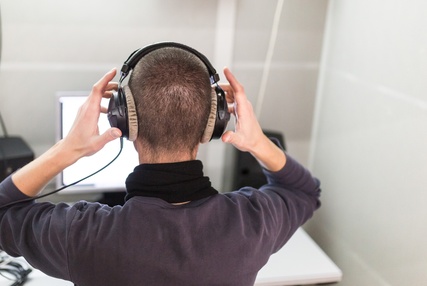10h00- 17h30
Anglais
Initiation
Tarif plein
:
1165 €
Mbre Forum Premium
:
815 €
Étudiant.e
:
585 €
Objectifs pédagogiques
À l’issue de la formation, les stagiaires disposeront des connaissances théoriques et pratiques nécessaires pour réaliser des systèmes interactifs sonores et musicaux utilisant les capteurs R-IoT (accéléromètres 9 axes WIFI), ainsi que des systèmes de reconnaissance de gestes. La programmation d’interfaces (Arduino, R-IoT) sera également abordée.
Public concerné
Compositeurs, compositrices, musiciens, musiciennes, performers, performeuses, enseignants, enseignantes, designers, designeuses
Prérequis
- Maitrise de l’anglais à l’écrit et à l’oral.
- Bonne connaissance de Max et de son environnement : pratique et compréhension des tutoriaux de base de Max (Max Basics tutorials 1 à 11, 14 à 22, Max Data tutorials 1 et 2, MSP tutorials, MSP Basics tutorials 1 à 5, MSP Panning tutorials 1 à 3, MSP Analysis tutorials 1 à 2, MSP Delay tutorials 1 à 3 et 6) ou avoir suivi le stage Max Initiation.
- Bonne maîtrise du vocabulaire anglais technique et des termes utilisés dans les logiciels audio courants.
- Maîtrise des principales fonctionnalités de l'ordinateur Macintosh (connaissance et manipulation du clavier et de la souris, créer et gérer des fichiers et des dossiers, naviguer dans les menus, lancer une application).
- La connaissance de base d’un séquenceur audio (Ableton Live, Reaper, Protools, Logic Pro…) est un plus.
- Des notions élémentaires en mathématiques faciliteront la compréhension : nombres entiers, rationnels et décimaux, addition, soustraction, multiplication, division, valeur absolue, étude de fonctions simples.
Durée de la formation et modalités d’organisation
24h, du mardi 19 mai au vendredi 22 mai 2026, de 10h à 13h et de 14h30 à 17h30
10 stagiaires maximum
Au cas où elle ne pourrait avoir lieu en présentiel, la formation ne pourra pas être maintenue.
Programme de la formation
Le programme de la formation pourra être ajusté en fonction des évolutions des logiciels utilisés.
Mardi
| Matin | Aperçu des différents types de capteurs, d’interfaces, et des fournisseurs de matériel. Le cas particulier des dispositifs sans fil ; Travaux pratiques : prise en main des environnements de programmation Arduino. |
| Après-midi | Travaux pratiques : maîtriser les bases de la programmation dans Arduino, premiers exemples simples de code, téléverser du code vers les interfaces Arduino et R-IoT. |
Mercredi
| Matin | Récupération et traitement des données de capteurs dans Max (Arduino et R-Iot) ; Filtrage (moyenne, filtre médian, filtre passe-bas) et normalisation. |
| Après-midi | Mise en place d’un système de mapping ; Utilisation directe des données de capteurs avec des processus sonores simples : contrôle de synthèses, lecture de fichiers sons. |
Jeudi
| Matin | Travaux pratiques : réaliser un système de sonification via des capteurs R-IoT, récupération des données et sonification dans Max. |
| Après-midi | Introduction à la librairie MuBu et au suivi de gestes. |
Vendredi
| Matin | Formation théorique : introduction au « machine learning » interactif avec la librairie Mubu for Max permettant des applications avancées de reconnaissance de gestes et mouvements. Présentation d’exemples d’utilisation dans des projets de sonification du mouvement et des projets artistiques (art perfomatif) |
| Après-midi | Travaux pratiques : réaliser un système avec capteurs R-IoT, apprentissage et reconnaissance dans Max avec MuBu. |
Moyens pédagogiques et techniques
- Salle de formation équipée d’ordinateurs Mac mini associés à de petits claviers/contrôleurs MIDI.
- Les participant·e·s auront à disposition des kits composés d’une carte R-IoT
Le module R-IoT est compris dans le coût de la formation (valeur : 99 euros HT). - Format de la formation : exposés théoriques et travaux pratiques
- Supports pédagogiques : présentations vidéo-projetées et support de cours en .pdf
Les environnement Max et Ableton Live ne sont pas inclus dans le tarif de la formation et ne seront pas fournis à l’issue de la formation.
Suivi
- Accueil le premier jour de la formation à partir de 9h45
- Contrôle du suivi par la signature d’une feuille de présence pour chaque demi-journée
- Remise d’un certificat de réalisation, qui intègre les résultats de l’évaluation.
.Évaluation
- Évaluation des connaissances acquises sous la forme de travaux pratiques réalisés au cours de la formation.





